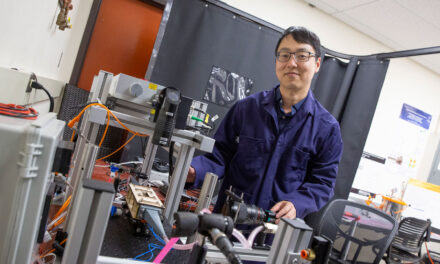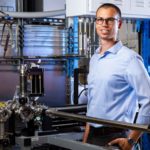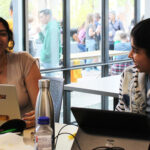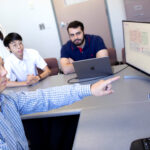
‘Quality of life’ goal drives transportation engineering student
Posted: April 06, 2011
Outstanding performance in class and lab earns him top national fellowship award
Keith Christian’s view on the value of transportation engineering goes beyond its contributions to providing data and designs to improve travel efficiency.
The Arizona State University graduate student sees it from a big-picture perspective: It’s a vital tool for improving our quality of life, for shaping our built environment in ways that can foster a sense of community cohesion.
It’s that outlook that gives him a passion for this branch of engineering. And it’s that passion, says his ASU faculty mentor, professor Ram Pendyala, that has motivated Christian to do “work of superior quality” in the classroom and the research lab.
That track record has led to Christian recently earning one of the most prized national fellowship awards for transportation engineering students.
An award from the Dwight David Eisenhower Transportation Fellowship Program – named for the late U.S. president and awarded by the U.S. Department of Transportation’s Federal Highway Administration – will cover Christian’s tuition and support his research as he pursues a master’s degree. It also includes funds for him to attend the annual meeting of the Transportation Research Board, one of the most prominent conferences in the profession.
The particular Eisenhower Fellowship Program award he received is among the most sought after, says Pendyala, a professor in the School of Sustainable Engineering and the Built Environment, one of ASU’s Ira A. Fulton Schools of Engineering.
“Thousands of students from top schools apply. Only a few hundred are chosen to receive it,” Pendyala says.
Christian, a graduate of Sunnyslope High School in Phoenix, earned his undergraduate degree in civil engineering at ASU last year. But his ambition wasn’t limited only to fulfilling degree requirements.
“I wanted to get more involved,” he says. “I wanted to do something more than just going to class, listening to lectures, doing homework and studying for exams.”
Christian became an officer in the ASU student chapter of the Institute of Transportation Engineers and took an opportunity to work as research assistant for Pendyala.
During his undergrad years, he helped organize two major transportation research symposiums at ASU and has taken a lead role in compiling and editing voluminous reports on presentations made at the events.
He contributed to an ASU research project to develop software to help engineers devise solutions to increasing demands on transportation systems. He then helped provide computer-based training in the use of the new software.
He was involved in another project using advanced computational methods to implement a new research tool called the Transportation Analysis and Simulation System.
“These are extraordinary achievements for an undergraduate or even a first-year grad student,” Pendyala says.
In addition to the accomplishments outside the classroom, Christian maintained a high grade point average, kept busy with church activities and began a family with wife, Marjie. Their daughter, Ada, was born a year and a half ago.
His wife “has been a great help to me getting through college,” he says, “and my daughter is an inspiration for me.”
As an undergrad, Christian also began work that will shape his graduate-level research pursuits: an extensive study of ways in which engineering design could effectively promote more fuel-efficient, less-polluting travel, as well as other steps toward establishing environmentally and economically sustainable transportation systems.
He’s embarking on detailed analysis of travel behavior to document how various segments of the population differ in their travel habits and transportation needs.
He’ll also try to gain insights into how transportation policies and systems can better serve vital needs of disadvantaged groups such the elderly, low-income families, children and people with physical disabilities.
In addition, he’ll take part in research at ASU to modernize transportation planning by the Maricopa Association of Governments.
Christian’s route to transportation engineering studies may seem unusual. He started in Phoenix Community College as a fine arts major. But he says the progression was logical for him.
“I like drawing, painting and photography. But I also like math and technology,” he says.
He recalls meeting an engineer and getting a chance to shadow him on the job.
“I saw how his work involved design, and that there was kind of an artistic side to it,” he recalls. “So I saw how engineering sort of has all the things that interest me wrapped into one package.”
His motivation to pursue a career that performs a community service springs from a two-year humanitarian mission in Mexico he participated in through his church after he graduated from high school.
“As an engineer I can help alleviate of lot of problems we all face,” he says. “There will always be more transportation needs. There will always be new challenges. I’ll have opportunities to have an impact on the future.”
“He cares about societal issues and enhancing people’s lives,” says professor Pendyala, “I have no doubt his work is going to be significant and meaningful.”



































